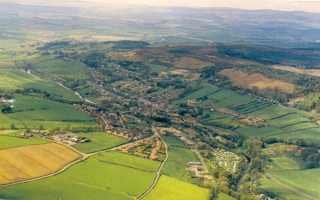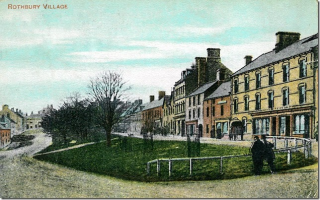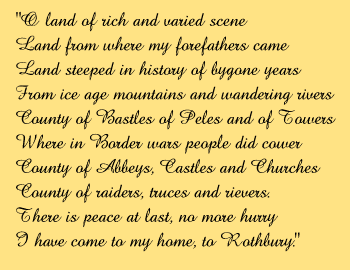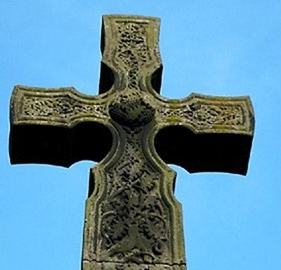

The village of Rothbury has always been the "Capital" of Upper Coquetdale (pronounced 'Coke-et dale') in Northumberland.

Aerial view of Rothbury
The upper reaches of the Parish follow the course of the river Coquet beyond Alwinton up towards Ad Fines or Chew Green, an old Roman Camp in the Cheviot Hills. This is a relatively remote area on the English side of the border with Scotland and was once called the Debatable Lands. The topmost part of the Parish is now on the Army's Otterburn Ranges.
Until fairly recently the area was made up of three Parishes, Rothbury, Alwinton and Holystone and Alnham. Now upper Coquetdale covers the whole area.
The Parish registers of the three Anglican Churches go back to 1653 in the case of Rothbury, Alwinton 1691 and Alnham 1688. All the original registers are deposited in Northumberland Archives at the Woodhorn Colliery Museum. Copies and transcripts together with their associated indexes are held locally.
There was one Catholic Church in the Parish at Thropton, however two of the largest catholic landowners had their own private chapels at Biddleston and Callaly.
The records of the Presbyterian Chapel that was at Harbottle are also deposited and have been transcribed. They tell us a lot about the farming families of the area. There was also a Presbyterian Chapel at Thropton and a Methodist Chapel in Rothbury.
At a later date two other Anglican Chapels of ease were built at Hepple and Thropton. There is now a Catholic Church in Rothbury.

Rothbury High Street
Coquetdale itself is the backbone of Northumberland, which itself is the area of England bounded by the River Tyne to the south, and the River Tweed to the north. The county is cut more or less in half by the moors of Rothbury Forest and the Simonside Hills.
The County History of Northumberland in fifteen volumes covers the whole County, while local authors have documented life in their particular area.
David Dippie Dixon had published in 1904 the book 'Upper Coquetdale', a very authoritative and comprehensive history of this Parish.
'A Corner of the North' by the Rev. Hastings M. Neville who was Rector of Ford 1872-1911 told of the history of the Border Folk.

 The Village Cross, Rothbury. It is dedicated to the memory of Lord Armstrong of Cragside; the greatest benefactor the village ever had.
The Village Cross, Rothbury. It is dedicated to the memory of Lord Armstrong of Cragside; the greatest benefactor the village ever had.